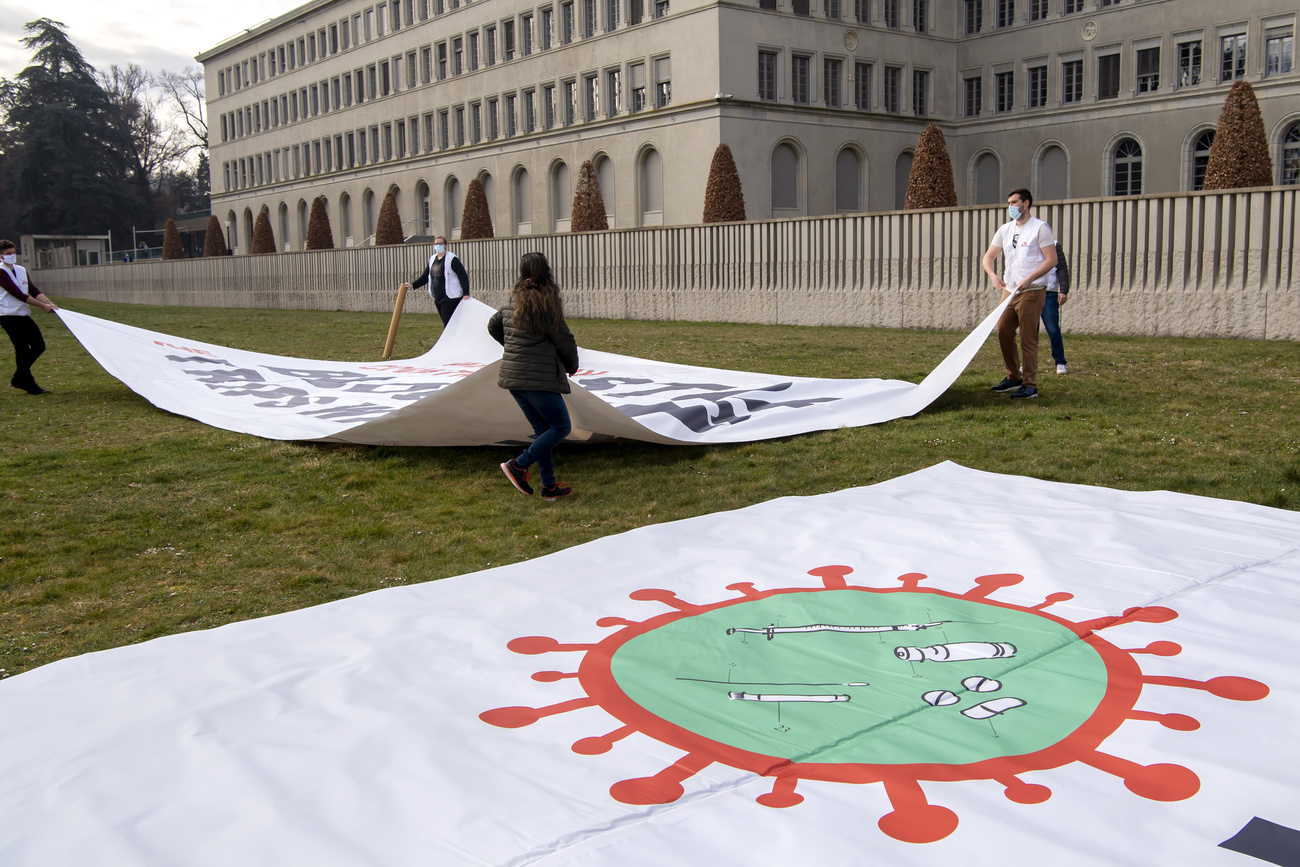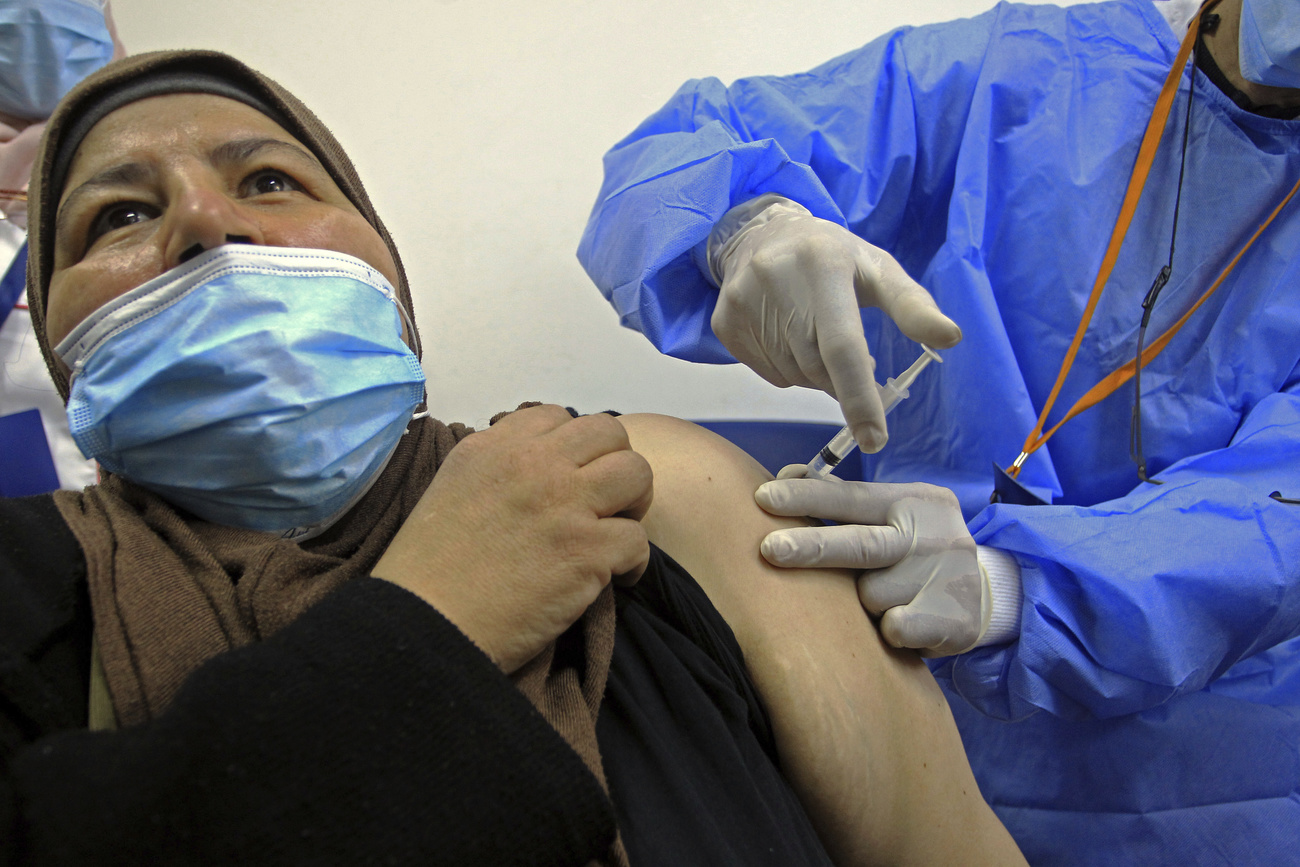
Vaccine patent waiver push takes centre stage in Geneva

Richer countries including Switzerland are resisting a push for a patent waiver on Covid-19 vaccine technology. But developing countries, which have been left out in the vaccine race, are keeping up the pressure at the UN in Geneva.
The largest vaccination campaign in history has reopened an old debate: does the monopoly on technology make sense in a situation of global crisis? In other words, does intellectual property need to be protected while millions die?
In October, India and South Africa brought an initiative at the World Trade Organization (WTO) for a temporary waiver for patents on all products that could be useful in curbing the pandemic. As well as vaccines, this would include tests, machines and possible treatments. If it were to be adopted, the waiver would be binding.
The idea is that laboratories around the world could have access to the technology and produce generic versions. This, in the view of the proposal’s authors, would both reduce the cost of vaccines and expand global production.
Over the months, more than a hundred countries began to support the project. But richer countries have resisted, insisting that the pandemic could not be a reason to break trade rules. Although still under negotiation, this initiative is currently stalled.
Keeping up the pressure
Meanwhile, China and African governments have introduced a separate draft resolution at the World Health Organization (WHO) with proposed measures to strengthen technology transfer and domestic production of vaccines. The draft, of which swissinfo.ch has obtained a copy, would oblige signatory countries to exert at least moral pressure on patent-holding companies to transfer technology.
Since it is the companies that own the patents, this might be tricky. But as the Swiss NGO Public Eye points out, most companies working on Covid-19 vaccines have received money from governments to do so. A recent Public Eye study says industries around the world have received over $100 billion for vaccine development with no attached financial risk.
The WHO draft resolution is also still under negotiation and is expected to be decided at the WHO’s World Health Assembly in May. Already EU governments and Japan are insisting on a clause stating that any technology transfer should be voluntary. Switzerland’s position on the WHO draft maintains the same line as adopted in the WTO negotiations. But a final position depends on the wording of the text that will be presented.
Swiss resistance
Switzerland is not alone among richer countries, notably the US, resisting the patent waiver push. But it was the position of the Swiss government, a traditional ally of the anti-poverty agenda and defender of access to health care, that has especially caught the attention of developing countries. In the case of vaccines, Bern has been adamant in rejecting the idea of giving up patents.
A meeting held at the WTO on March 10 became a clear mirror of such a stance. The Swiss said Covid-19 vaccines are complex, involving new manufacturing processes and facilities or extensive repurposing of existing ones. According to them, only the patent system in place provides the necessary incentives for cooperation between vaccine developers and manufacturers and enables assistance, as well as technology and know-how transfer. Therefore, they argued, it is “misleading” to believe that the temporary suspension of patents would translate swiftly into a worldwide supply of Covid-19 vaccines.
In a statement sent to swissinfo.ch, the Swiss government said that it has “always advocated internationally for universal access to healthcare”. But Bern insisted that “to respond to the pandemic, close and seamless collaboration is needed between all the relevant stakeholders, namely states and international organisations, universities, research institutions, pharmaceutical companies and non-governmental organisations”.
“This is why Switzerland is rejecting India and South Africa’s proposal in the WTO,” it explained. “Patent protection ensures that, in addition to government funding, the necessary private investments are made in research and development. Switzerland is therefore convinced that suspending the established international legal framework would be the wrong approach.”
For the Swiss government, such a position does not imply a lack of commitment for a global response. “Switzerland has been committed from the beginning to a global solution for equitable distribution of future SARS-CoV2 vaccines in all countries,” it said, adding that an answer to the current crisis is to strengthen the Covid-19 Global Vaccine Access Facility (COVAX).

More
In the vaccine race, can COVAX help poorer countries catch up?
Reflecting the industry stance
The Swiss government position is echoed by the pharmaceutical industry. “It has been a tremendously daunting challenge, and so far things have gone better than could have expected,” said Thomas Cueni, Director General of the International Federation of Pharmaceutical Manufacturers and Associations (IFPMA), also based in Geneva. “But going forward, solidarity from richer countries to help others will be key.”
“There have been claims that intellectual property rights are hindering the response to the pandemic,” he said. But the industry says diluting national and international intellectual property (IP) frameworks during this pandemic is counterproductive. “It will not lead to faster research and development or access, but will undermine confidence in what has proven to be a well-functioning IP system, allowing industry to partner with confidence with academia, research institutes, foundations and other private companies, significantly expediting the research and development of medicines to address the world’s many unmet medical needs,” Cueni concluded.
Moral outrage
From the start, both WHO and UNAIDS have expressed their support for the initiative to waive patents and search for a new model of technology sharing. “The waiver would reduce transaction costs and eliminate key barriers across the research and development cycle and the supply chain for the access and delivery of health technologies to prevent, diagnose and treat Covid-19,” they said at an October meeting at the WTO.
UNAIDS said the international community should not repeat the “painful lessons” from the early years of the AIDS response, when people in wealthier countries had access to medicines while millions of people in developing countries were left behind. “It is a matter of human rights, and governments cannot address the current pandemic as business as usual,” said UNAIDS.
Six months on, the issue is not resolved. WHO Director-General Tedros Ghebreyesus has called the uneven distribution of vaccines a “moral outrage” and suggested that countries and industries find a way to break the stalemate.

In compliance with the JTI standards
More: SWI swissinfo.ch certified by the Journalism Trust Initiative





























You can find an overview of ongoing debates with our journalists here . Please join us!
If you want to start a conversation about a topic raised in this article or want to report factual errors, email us at english@swissinfo.ch.